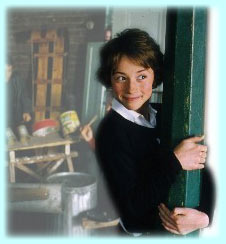|
Miki
Manojlovic
Hanna's father
 Miki
Manojlovic was born in Belgrade,
and spent his childhood in the theatre whose company was
founded by his thespian parents. In the 1970's, a student
at the Belgrade School of Dramatic Art, he discovered
the concept of "acting" in all its theatrical
forms from the classical repertoire of world literature
to more contemporary and experimental works. At a very
young age, he became one of the most well-known actors
in the former Yugoslavia. Since then Miki Manojlovic
has played more than 35 leading roles in a variety of
works, endlessly pursuing new theatrical spaces and new
meanings for the term "acting." Miki Manojlovic
has won all the awards and distinctions for dramatic art
in the former Yugoslavia. He is also the recipient of
the prestigious German award "Theatre an der Ruhr"
for best stage actor in Yugoslavia in 1979. This prize
is awarded every four years, alternating between Germany
and the former Yugoslavia. He has worked on theatrical
performances with prominent directors, such as Peter Brook
who holds a special place in Miki Manojlovic's
life, as does the unforgettable experience he acquired
during the creative process of the English version of
Mahabharata. He has performed in theatres in Amsterdam,
Bucharest, Bratislava, Budapest, Berlin, Trieste, Warsaw,
and on every Yugoslavian stage. Guided by the philosophy
that all theatrical processes must be seen through to
fruition, he has turned down opportunities to perform
in London, Los Angeles, New York, Tokyo, Perth and Adelaide.
The many theatrical productions he has worked on include:
Shakespeare's Hamlet (1972), The Mandrake
by Machiavelli (1973), Goldoni's Squabbles at Chioggia
(1974), Death of a Salesman by Arthur Miller (1975-76),
Chekov's The Seagull (1976). Kiest's The Prince
of Hamburg (1977), Caligula by Camus (1977-78),
War and Peace by Tolstoy (1979), Shakespeare's
Macbeth (1981), Brook's Mahabharata (1987),
Brecht's Baal (1988), The Birds by Aristophanes
(1989), Cyrano de Bergerac by Rostand (1990), Dostoyevsky's
Crime and Punishment (1991), Beckett's Waiting
for Godot (1991), and Shakespeare's Richard III
(1992). Miki
Manojlovic was born in Belgrade,
and spent his childhood in the theatre whose company was
founded by his thespian parents. In the 1970's, a student
at the Belgrade School of Dramatic Art, he discovered
the concept of "acting" in all its theatrical
forms from the classical repertoire of world literature
to more contemporary and experimental works. At a very
young age, he became one of the most well-known actors
in the former Yugoslavia. Since then Miki Manojlovic
has played more than 35 leading roles in a variety of
works, endlessly pursuing new theatrical spaces and new
meanings for the term "acting." Miki Manojlovic
has won all the awards and distinctions for dramatic art
in the former Yugoslavia. He is also the recipient of
the prestigious German award "Theatre an der Ruhr"
for best stage actor in Yugoslavia in 1979. This prize
is awarded every four years, alternating between Germany
and the former Yugoslavia. He has worked on theatrical
performances with prominent directors, such as Peter Brook
who holds a special place in Miki Manojlovic's
life, as does the unforgettable experience he acquired
during the creative process of the English version of
Mahabharata. He has performed in theatres in Amsterdam,
Bucharest, Bratislava, Budapest, Berlin, Trieste, Warsaw,
and on every Yugoslavian stage. Guided by the philosophy
that all theatrical processes must be seen through to
fruition, he has turned down opportunities to perform
in London, Los Angeles, New York, Tokyo, Perth and Adelaide.
The many theatrical productions he has worked on include:
Shakespeare's Hamlet (1972), The Mandrake
by Machiavelli (1973), Goldoni's Squabbles at Chioggia
(1974), Death of a Salesman by Arthur Miller (1975-76),
Chekov's The Seagull (1976). Kiest's The Prince
of Hamburg (1977), Caligula by Camus (1977-78),
War and Peace by Tolstoy (1979), Shakespeare's
Macbeth (1981), Brook's Mahabharata (1987),
Brecht's Baal (1988), The Birds by Aristophanes
(1989), Cyrano de Bergerac by Rostand (1990), Dostoyevsky's
Crime and Punishment (1991), Beckett's Waiting
for Godot (1991), and Shakespeare's Richard III
(1992).
Coupled
with his theatre experience, Miki Manojlovic has
acted for film in his mother tongue, Serbo-Croat, as well
as in Rom (the language spoken by gypsies), English and
French. In the cinema he adheres to the principle that
any new idea for a film is an introduction to the process
of expressing something which has yet to be defined through
acting. Miki Manojlovic has had a prolific film career
and he occupies an important place in the world of cinematography.
His 31 film credits include: La Chasse directed
by Zivojin Pavlovic (1976), On n' aime qu' une seule
fois directed by Rojko Grlic (Cannes, Valencia 1981),
Mi-figue mi-raisin directed by Srdan Karanovic
(Cannes, 1983), Il faut être trois pour être
heureux directed by Rajko Grlic (1984), Papa est
en voyage d' affaires directed by Emir Kusturica (Oscar
nominee for best film, 1986), Dur à avaler
directed by Srdan Karanovic (Montréal, 1986), Migrations
directed by Alexandre Petrovic (1988), Le temps des
miracles directed by Goran Paskaljevic (Director's
Fortnight, Cannes, 1989), Un week-end sur deux
directed by Nicole Garcia (1989), Tito et moi directed
by Goran Markovic (1992), Tango Argentino directed
by Goran Paskaijevic (1992), Underground directed
by Emir Kusturica (Palme d'Or, Cannes 1994), Someone
Else's America directed by Foran Paskaljevic (people's
Choice award, Director's Fortnight, Cannes, 1995),
Portraits chinois directed by Martine Dugowson (1995),
Artémisia directed by Agnes Merlet (Golden
Globe nominee, 1998), Gypsy Magic directed by Aurelio
Grimaldi (1997), Les blessures directed by Srdjan
Dragojevic (1998), Le baril de poudre directed
by Goran Paskaljevic (1998), Chat noir, chat blanc
directed by Emir Kusturica (1998).
|